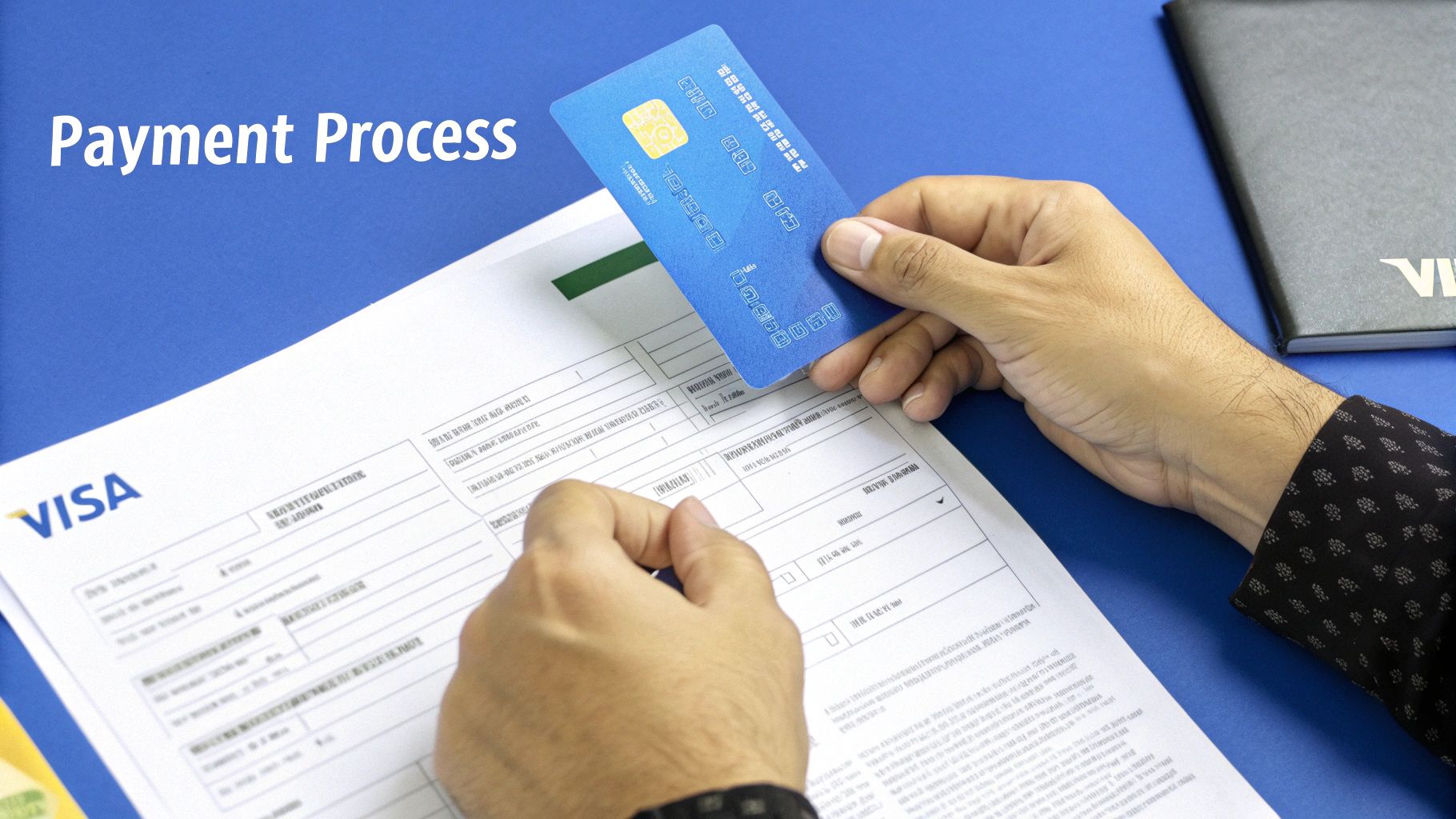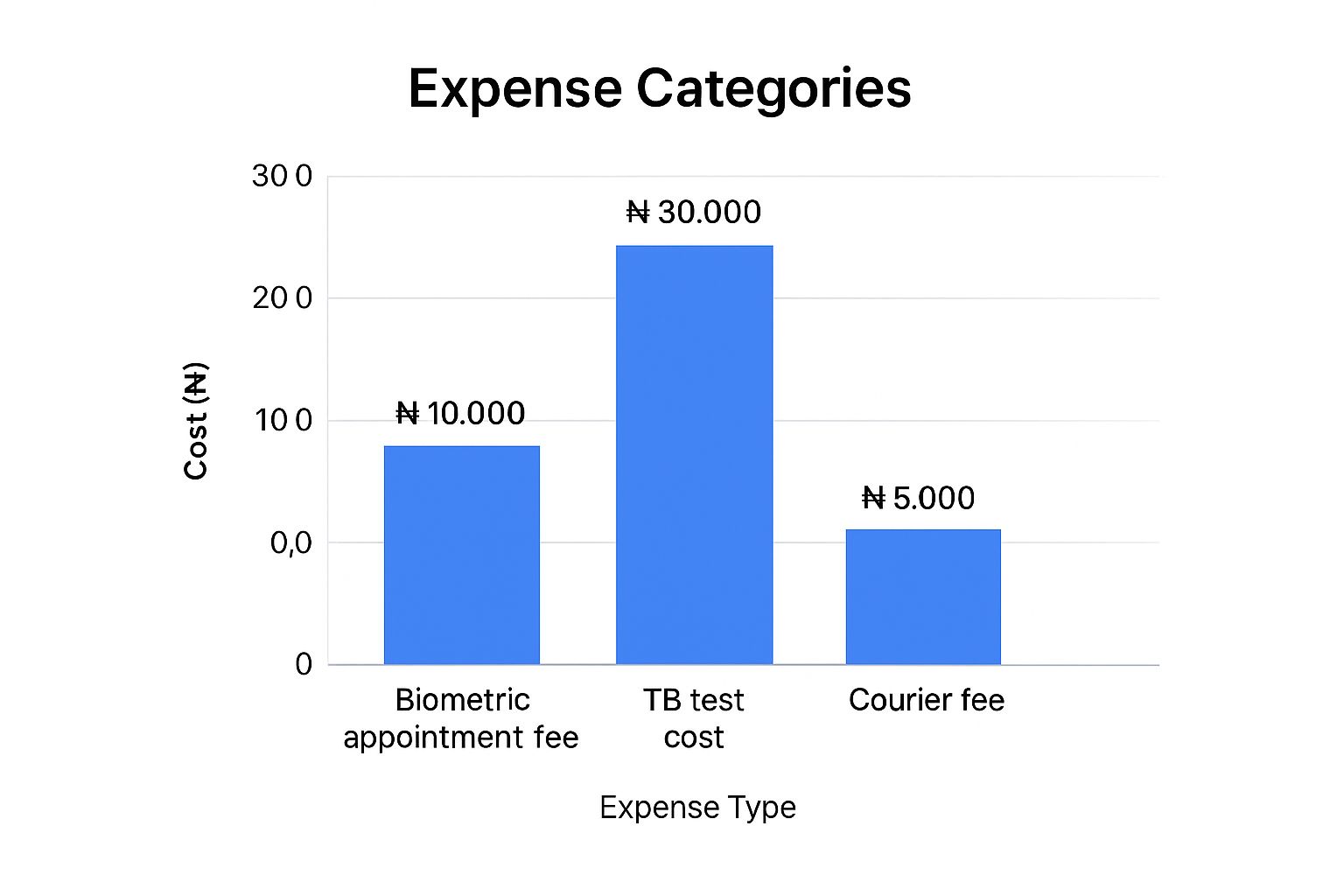A Nigerian’s Guide to UK Student Visa Fees: The Real Cost in 2024

So, you're planning to study in the UK and need to figure out the UK student visa fee in Nigeria? Let's get straight to the point. The first and most important fee you must budget for is the main application fee, which is £490.
This is the standard, non-negotiable charge from the UK government just to process your application. Think of it as the 'gate fee' for your study abroad journey—it’s the very first cost you'll have to pay.
Of course, since the fee is in British Pounds, the amount you actually pay in Naira will change with the daily exchange rate. What costs you around ₦880,000 today might be slightly different tomorrow, so it’s smart to check the latest rates as you get ready to pay.
Understanding the Core Application Fee
Before we dive into other costs, it's crucial to understand this foundational fee. Every single Nigerian student applying from outside the UK has to pay it. It's the starting point for your entire visa budget.
This fee covers the administrative work done by the UK Visas and Immigration (UKVI) department to assess your application documents and decide on your visa.
Why Did the Fee Go Up?
If you've been researching this for a while, you might have noticed the price has changed. You're not imagining things. In October 2023, the UK government increased this fee by almost 35%, taking it from £363 up to the current £490.
This was a big jump, part of a wider UK policy to adjust immigration and nationality fees. Knowing this helps you understand why the costs are what they are today and allows you to budget more accurately. It wasn't a small change, and it affects every new student from Nigeria.
To give you a clearer picture, let's break down the primary costs you can expect.
Core UK Student Visa Costs At a Glance
Here's a quick summary of the main, unavoidable fees you'll face when applying for your student visa from Nigeria.
| Fee Component | Cost in Pounds (£) | Estimated Cost in Naira (₦) |
|---|---|---|
| Student Visa Application Fee | £490 | Varies daily, but budget around ₦850,000 – ₦900,000 |
This table shows the starting line for your budget. Remember, the Naira figure is an estimate and will be finalised when you make your payment. The exchange rate used by the payment portal is often higher than the market rate.
Keep in mind, this £490 is just one piece of the financial puzzle. You’ll also need to account for the Immigration Health Surcharge (IHS) and biometric appointment fees, which we’ll cover next.
For those curious about other UK immigration routes, you might find it helpful to compare this with the breakdown of UK work visa costs from Nigeria. It gives a broader view of what it costs to move to the UK.
Understanding the Mandatory Immigration Health Surcharge
Right, let's talk about a cost that often catches Nigerian students off-guard: the Immigration Health Surcharge (IHS). This isn't some optional add-on; it's a compulsory fee you have to pay on top of your main visa application charge.
Think of it as your contribution to the UK’s National Health Service (NHS). By paying the IHS upfront, you gain access to doctors and hospitals in the UK for free when you need them, just like a UK resident. It’s like paying for a full health insurance plan before you even pack your bags.

How Much Will the IHS Cost Me?
This is where you need to get your calculator out. The IHS isn't a single, flat fee. It’s calculated based on the total length of your visa, and the current rate for students is £776 per year.
One crucial detail: if your course duration includes part of a year (say, six months and one day), you'll be charged for the next full year. You can get more details on the complete cost breakdown for Nigerian students on AECC Global.
Let’s run through a couple of practical examples for Nigerian students:
- You're doing a 1-year Master's Degree: Your visa will usually be granted for the length of your course plus a few extra months at the end. For this, you’ll typically pay for 1.5 years. The total would come to about £1,164 (£776 for the first year + £388 for the extra 6 months). In Naira, that's a huge chunk of money—over ₦2 million.
- You're starting a 3-year Bachelor's Degree: This is more straightforward. You’ll be charged for the entire three years, making your total IHS fee £2,328 (£776 multiplied by 3). That’s over ₦4 million you need to have ready.
The most important thing to remember is that you must pay the entire IHS fee for your whole course duration at once, when you submit your visa application. This can be a substantial lump sum, so it's absolutely vital to factor it into your budget from day one to avoid any nasty financial surprises.
Navigating Visa Payments From Nigeria
Knowing the fees is one thing; actually getting the money paid from Nigeria can be a whole different ball game. Let’s break down how you can pay your UK student visa fee, focusing on what actually works for Nigerian applicants and how to get around common banking roadblocks.
Think about it from the perspective of a student, let's call her Chioma from Abuja. She’s got her application sorted, but now she’s at the payment gateway. The fees are listed in British Pounds (£), but her bank account is in Naira (₦). This is where the real headache can start.

Accepted Payment Methods
The most straightforward way to pay your visa and IHS fees is online with a debit or credit card. But here's the catch: due to banking restrictions on international transactions in Nigeria, your regular Naira card is almost certain to be declined due to the low monthly spending limits (often just $20).
This leaves you with two reliable options that most successful applicants use:
- USD Domiciliary Account Card: This is, by far, the best way to go. If you have a dollar account with a Nigerian bank, your linked debit card can handle international payments without the frustratingly low limits imposed on Naira cards. So, Chioma could simply fund her domiciliary account and use her dollar card to pay the £490 visa fee and IHS without any issues.
- Payment at a Visa Application Centre: You can also choose to pay in person at a visa application centre, like TLScontact in Lagos or Abuja. They accept payments, usually via Point of Sale (POS), and this serves as a great backup plan if your online payment just won't go through.
A Warning About Unofficial Agents
You’ll see plenty of "agents" on Nairaland, WhatsApp, and offline offering to pay your visa fees for you, often for what seems like a small extra charge. Tread very, very carefully here. Giving your application login details and payment information to an unverified third party is a massive risk.
Using an unofficial agent doesn't just open you up to potential fraud; it can also lead to mistakes being made in your application that you'll have to answer for. It's always safer to manage the payment yourself through official channels—either the UKVI portal or at a TLScontact centre. That peace of mind is worth far more than any convenience they promise.
What About Form A?
It's a common question, but it’s crucial to know that Form A is not for paying your visa application fees. The Central Bank of Nigeria's Form A process is specifically for large-scale foreign currency transactions, like your university tuition and accommodation deposits.
For the visa and IHS fees, you need to stick to the card payment methods we've covered.
Planning ahead is key. If you can, get a domiciliary account set up and funded well in advance. This one step can make the payment process incredibly smooth, ensuring your application isn't held up by a declined transaction and getting you one step closer to your UK study goals.
Calculating Your True Visa Budget
To get a real sense of what your UK student visa will cost, you need to look past the big-ticket items like the application fee and the IHS. Think of those as the starting price; the final bill includes several other costs, both mandatory and optional, that are part of the process for every Nigerian applicant.
Getting these smaller, yet absolutely crucial, expenses into your budget from day one is the key to a stress-free application. They aren't just suggestions—they are non-negotiable steps you'll have to take.
Mandatory Extra Costs
Before you even hit 'submit' on your main visa application, you'll have to pay for a couple of essential services right here in Nigeria. These fees aren't paid to the UK government, but you can't move forward without them.
There are two main costs you simply can't sidestep:
- Tuberculosis (TB) Test: As a Nigerian applicant, you are required to get a TB test from a clinic approved by the UK Home Office in Lagos or Abuja. This health check is mandatory, and you'll need the certificate it provides to complete your visa application.
- Biometric Appointment Fee: You’ll need to visit a visa application centre, like TLScontact in Lagos or Abuja, to have your fingerprints and photograph taken. There's an administrative fee that comes with this appointment.
This infographic gives you a clear picture of what these services typically cost.

As you can see, these local costs can add a hefty sum to your overall budget before you've even paid the main visa fee itself.
Optional Services to Consider
On top of the required costs, there are a few optional services you can choose to pay for. These are mostly about making the process faster or more convenient.
For instance, if your university resumption date is just around the corner, the Priority Visa service might be worth considering. It comes with an extra charge, but it’s designed to get you a decision in about five working days, which can be a real lifesaver. Other optional add-ons include things like document scanning or paying for a courier to safely return your passport.
While these services are technically optional, it's wise to at least budget for the courier service. Factoring in these smaller amounts from the beginning helps you avoid the headache of surprise bills when you're already feeling the pressure.
For anyone looking to ease the financial burden, exploring avenues like Grants to Pay Off Student Loans can make a real difference to your overall budget.
To help you keep track of everything, here’s a complete breakdown of all the potential costs you might face.
Your Complete UK Visa Application Cost Checklist
This table pulls together every potential expense, from the big application fee to the smaller local charges, giving you a clear, all-in-one view of your total budget.
| Expense Item | Is it Mandatory? | Estimated Cost Range (₦) |
|---|---|---|
| Main Visa Application Fee | Yes | ₦880,000 (Approx. £490) |
| Immigration Health Surcharge (IHS) | Yes | ₦1,390,000 per year (Approx. £776) |
| Tuberculosis (TB) Test Fee | Yes | ₦57,800 – ₦115,600 |
| Biometric Appointment Fee | Yes | ₦12,000 – ₦25,000 |
| Priority Visa Service | No | ₦500,000+ |
| Super Priority Visa Service | No | ₦1,000,000+ |
| Document Translation | No (if needed) | ₦5,000 – ₦20,000 per document |
| Passport Courier Return | No | ₦5,000 – ₦15,000 |
By using this checklist, you can confidently plan your finances and ensure there are no unexpected surprises along the way.
Mastering the Proof of Funds Requirement
https://www.youtube.com/embed/eonRdEySFhw
Alright, let's talk about the big one: Proof of Funds, or what many Nigerian students call 'show money'. This isn't a fee you actually pay to anyone; it's the money you must prove you have in your bank account for your studies in the UK.
Think of it this way: the UK government wants to be sure you can pay your school fees and 'sort yourself out' for your first year without struggling. It’s their way of making sure you’re genuinely coming to study and can support yourself financially.
How to Calculate Your 'Show Money'
The UKVI has a very clear formula for this, leaving no room for guesswork. You need to show you have enough money to cover two main things:
- Your outstanding tuition fee for the first academic year. This is the balance of your first year's fees after paying your initial deposit. You'll find this exact figure on your Confirmation of Acceptance for Studies (CAS) from your university.
- A fixed amount for living costs to cover your accommodation, food, and other day-to-day expenses.
The living cost part is where location comes into play. The UKVI sets two different rates:
- £1,334 per month for students studying in London.
- £1,023 per month for students studying anywhere else in the UK (outside London).
You need to prove you have these funds for a maximum of nine months. This means the total living expenses you must show are £12,006 for a course in London or £9,207 for a course outside London.
Let’s break it down with a realistic example. Imagine Tunde is going to Coventry University (outside London). His first-year tuition is £16,000 and he has paid a £4,000 deposit. He would need to show:
(£16,000 – £4,000) Outstanding Tuition + £9,207 Living Costs = £21,207 total in his account.
The All-Important 28-Day Rule
Now, here’s a detail that trips up many applicants. It's not enough to just have the money. The UKVI needs to see that the full amount has been held in your bank account (or your parents' account) for a minimum of 28 consecutive days.
The closing balance on any given day during that 28-day period must not drop below the required total. The bank statement you submit with your application must also be no more than 31 days old. Getting this timing wrong is one of the most common reasons for a visa refusal, so be meticulous with your dates!
For a more comprehensive look at all the paperwork involved, be sure to read our guide on UK student visa requirements.
Answering Your Top Questions About UK Visa Fees
Let's dive into some of the most pressing questions Nigerian students ask about paying for their UK student visa. Getting these details straight can save you a lot of stress down the line.
Can I Pay My Visa Fee in Naira?
Yes and no. While the money will come from your Nigerian account, the official visa fee is set in British Pounds (£). When you pay online, the system converts the amount to Naira using its own exchange rate for that day.
Be warned: this rate is often not as favourable as the parallel market rate. Because of this, and the frustratingly low spending limits on most Naira cards (e.g., $20/month), it is much easier and safer to pay using a card linked to a USD domiciliary account. It just makes the process smoother and avoids payment failures.
What Happens if My Visa Is Refused?
This is the big fear, and it's a valid worry for many. If your visa application is refused, unfortunately, the main £490 application fee is non-refundable. The UK government keeps this to cover the administrative costs of reviewing your file.
But it's not all bad news. The hefty Immigration Health Surcharge (IHS) you paid upfront will be fully and automatically refunded. You should see the money returned to the card you paid with, usually within about six weeks of getting the refusal notice.
Is the Priority Visa Service Worth the Extra Cost?
This really boils down to your personal timeline and how close you are to your school's resumption date. The Priority Visa service is an add-on that promises a much faster decision, typically within about five working days. If your course starts in a few weeks, this service can be an absolute lifesaver.
However, if you've applied with plenty of time to spare (say, two or three months before your course starts), the standard service is perfectly fine and will save you a good chunk of money. To get a better feel for how the rules are changing, you might want to read up on the new UK immigration white paper and how it affects students.
Feeling a bit lost in the immigration maze? Let JapaChat point you in the right direction. As Nigeria’s first AI immigration expert, we give you instant, reliable answers on everything from visa fees to proof of funds. Plan your move with clarity. Get started for free at https://japachat.com.

Leave a Reply